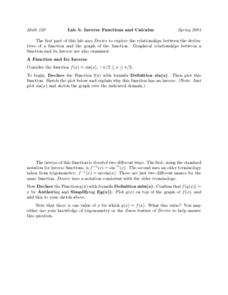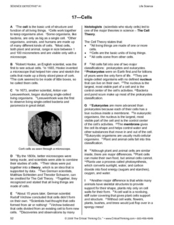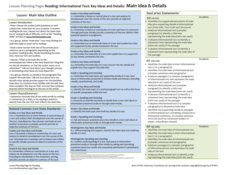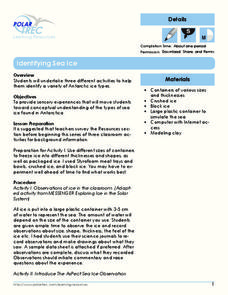Flipped Math
Calculus AB/BC - The Fundamental Theorem of Calculus and Accumulation Functions
Connect integrals with differentiation. The beginning of the video introduces the definition of an accumulation function. Scholars learn about the relationship between integrals and derivatives. Using what is commonly known as Part Two...
Curated OER
Point- vs. Non-point Pollution
Students differentiate between point and non-point pollution and determine how the different types of pollution are harmful to aquatic ecosystems. They complete a series of tests on a sample of "polluted" water and a sample of "pure" water.
Curated OER
Lab 5: Inverse Functions and Calculus
Learners identify graphical relationships between a function and its inverse using a graphing calculator. They begin by declaring the function f(x) with formula definition sin(x), then plot this function. To finishing the lab, they check...
Curated OER
Compound Inequalities and Graphing
Put geometry skills to the test! Learners solve compound inequalities and then graph the inequalities on a coordinate plane using their geometric skills. They identify the slope and y-intercept in order to graph correctly. I like this...
Curated OER
Kinetic and Potential Energy
A single-page learning exercise that displays a diagram of the swing of a pendulum for physics apprentices to practice with is here for you. Pupils differentiate between potential and kinetic energy, relate the diagram to the law of...
Curated OER
17 - Cells
The first of three pages in this handout provides a brief history of our understanding of the cell. It also differentiates between prokaryotic and eukaryotic cells. The second is a collection of true and false, multiple choice, and short...
Curated OER
Recognizing Litter
When is it litter? Help your environmentally friendly scholars differentiate using this visual worksheet. They examine two images: before it becomes litter, and after it becomes litter. The images can be colored in completely, or you can...
Curated OER
Finding the Main Idea
The carnival is in town! After reading a short excerpt about a day at the carnival, learners use details to determine the story's main idea. They must differentiate the details from the big picture, as there are multiple options they can...
Curated OER
Most and Least
Which one has the most? Each row has three sets of identical objects, and scholars compare the sets to determine which has the most or the least (they find the most for the first four and the least for the last four). One example is...
Curated OER
Location on a Grid
There are 12 symbols on this large grid, and scholars must record a location for each. They use the coordinate pair system which is made easier because every symbol is directly inside a square. Use this to introduce coordinate pair...
Curated OER
Shortened Words
Shorten names and words with different activities. Nicknames, acronyms, and shortened words (fridge instead of refrigerator, for example) are ways for third graders to build their vocabulary and differentiate between formal and informal...
Curated OER
Distinguishing Between Flowers
A branching key is a great way to classify different types of animals and plants! Fifth graders answer several yes/no answers about three different plants. They then create their own key to differentiate between an iris, a rose, and a...
Curated OER
"I'm Melting!"
Third and fourth graders engage with a worksheet designed to help them differentiate between melting and dissolving. After reading an informative paragraph about the two actions, they consider four scenarios, and choose whether they...
For the Teachers
Main Idea Outline
Find the main idea in an informational text with a versatile lesson plan. Three levels of differentiation help you implement the strategy in any age or class level, based on the ability and objectives of your learners.
Curated OER
Carnival Tickets
A great subtraction and division discovery opportunity for young mathematicians, this learning task involves seven word problems that require multiple steps. Learners use a math table to persevere in solving problems that are...
Curated OER
Number Rods
Working in a math center or an "I finished early" work station, young mathematicians will match in sequence pre-set-up rods of unifix cubes to numbers on a number line. To help differentiate tens from ones, use different colors to...
Super Teacher Worksheets
Ten Frames
Developing a strong number sense in the primary grades is essential to the success of young mathematicians. These simple worksheets present learners with a series of ten-frames, asking them to write the number shown in each model....
Education Center
Terrific Teamwork!
After reading Officer Buckle and Gloria by Peggy Rathmann, have your first graders differentiate between Gloria's actions and Officer Buckle's actions. Using a Venn diagram organizer, kids cut out various events from the story and...
Florida Center for Reading Research
Comprehension: Text Analysis, Fact or Opinion Football
Touchdown! Try out this game to help your learners differentiate between fact and opinion. In pairs, pupils switch off reading cards to one another. Learners determine if the sentences on the cards are facts or opinions and continue...
DePaul University
Bold Plans, Big Dreams, City Progress
Determining which statements represent fact or the author's opinion in an integral part of reading informational text. Encourage seventh graders to read a passage about Barack Obama and the city of Chicago, as well as a passage focused...
Sign Writing
American Sign Language Hand Symbols
Whether you are learning or teaching American Sign Language, a thorough resource on the ways to depict different hand symbols is sure to enhance your journey into proficiency. With sections on different hand symbol groups, including...
Journey Through the Universe
Our Solar System
Take your class on a journey through our solar system. Learners explore each planet, from Mercury to Pluto, and discuss various features that differentiate one from another. They complete activities related to the topics and discuss the...
Polar Trec
Identifying Sea Ice
Sea ice contains 17 sub-types based on age and various characteristics. Scholars observe ice floating in a simulated ocean and record their observations. Then, they view photographs of different types of sea ice and learn to...
West Contra Costa Unified School District
Average Rate of Change
The concept of slope gets an approachable, yet theoretical, treatment in a comprehensive algebra lesson. The use of functional notation and problem-solving techniques keep the material rigorous, but detailed teaching notes and lots of...
Other popular searches
- Cellular Differentiation
- Cell Differentiation
- Implicit Differentiation
- Genetic Differentiation
- Differentiation and Math
- Anti Differentiation
- Differentiation Strategies
- Differentiation Rule
- Differentiation Lesson Plans
- Logarithmic Differentiation
- Differentiation Component
- Writing Differentiation























